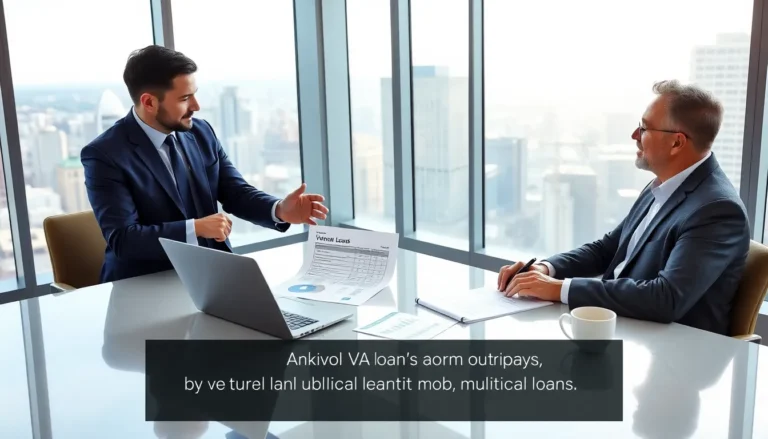Table of Contents
ToggleHave you ever wondered if you can simply take over someone else’s VA loan? It sounds kind of like a magic trick, right? Well, buckle up, because we’re diving into the world of VA loans and loan assumptions. The good news is: buying a home with a VA loan isn’t just for veterans: it could be your ticket to a fantastic deal on a property. But, things can get a bit tricky, so understanding the ins and outs is essential. Let’s unravel the mystery behind VA loans and find out if they are indeed assumable.
Understanding VA Loans

VA loans, or Veterans Affairs loans, are designed to help veterans, active-duty service members, and certain members of the National Guard and Reserves achieve the dream of homeownership. Backed by the U.S. Department of Veterans Affairs, these loans offer several attractive features such as no down payment, no private mortgage insurance (PMI), and competitive interest rates.
Unlike conventional loans, VA loans cater specifically to those who have sacrificed for their country. They offer borrowers a chance to get the financing they need, often with more favorable terms. But, when it comes to assumability, not all VA loans are created equal.
To grasp the full picture, it’s crucial to understand the basic workings of VA loans and how they can benefit you. This foundation will set the stage for our discussion on loan assumption and its implications.
What Is Loan Assumption?
Loan assumption is essentially a transfer of the loan responsibility from one borrower to another. When a loan is assumed, the new borrower takes over the remaining balance on the original loan, along with the terms and conditions associated with it. Imagine buying a car and taking over the payments without needing to get a new loan.
For VA loans, this gives potential buyers a unique opportunity. Instead of applying for a new loan, which could involve extensive paperwork and the stress of credit checks, they can simply step into the seller’s shoes – this can be particularly advantageous if the original loan has a lower interest rate compared to current market rates.
Eligibility for Assumable VA Loans
Not every VA loan is automatically assumable. Here’s the kicker: the eligibility largely depends on the terms set forth in the original loan agreement. Here’s what you need to know:
Types of VA Loans That Are Assumable
- Fixed-Rate VA Loans: These are generally easier to assume compared to adjustable-rate mortgages. Why? Because the terms are stable and predictable, making the process more appealing.
- VA Adjustable-Rate Mortgages (ARMs): While some ARMs can be assumed, it’s crucial to check the specific terms of the loan since features may vary.
- VA Loans Closed on or After March 1, 1988: Loans made after this date often include assumability clauses, making them easier to transfer.
But, not every VA loan meets this criterion. So, prospective buyers should carefully review the loan terms and consult with their lender to determine if the assumption is permissible.
Benefits of Assuming a VA Loan
Assuming a VA loan comes with several noteworthy advantages:
- Lower Interest Rates: If the current market rates are higher than the original loan, you could save a significant amount over time.
- Reduced Closing Costs: Since you are not applying for a new loan, you could save on certain fees associated with obtaining a fresh mortgage.
- Faster Acquisition Process: The assumption process can be quicker and less stressful, as it might require less paperwork and fewer approvals compared to standard loan applications.
- No Down Payment Requirement: This can ease financial burdens, particularly for first-time homebuyers.
In essence, assuming a VA loan can make homeownership more accessible, especially for those looking to step into a favorable financial situation.
Process of Assuming a VA Loan
The process of assuming a VA loan typically involves the following steps:
- Get Approval: The original borrower must get approval from their lender to allow for the assumption of the loan. This can include providing documentation that the new borrower is eligible.
- Lender Assessment: While the assumption is often simpler, lenders may still want to evaluate the creditworthiness of the person assuming the loan. Depending on individual circumstances, the lender may request necessary financial documents.
- Legal Considerations: It’s wise to consult with a real estate attorney to ensure all legal documents are transferred correctly and that the terms of the loan are upheld.
- Finalizing the Transfer: Once approvals and assessments are completed, the transfer can be finalized, often resulting in lower stakes and smoother transitions.
As simple as it sounds, challenges can arise. So, a bit of preparation and proactive communication with lenders can streamline the entire process.
Potential Challenges and Considerations
While there are several benefits to assuming a VA loan, potential challenges also lurk in the shadows:
- Strict Lender Policies: Some lenders may impose stricter conditions that could hinder the assumption process, making it essential to verify any requirements early on.
- Existing Liabilities: When assuming a VA loan, the new borrower may inherit liabilities associated with the original loan. This means financial accountability for any late payments or default could transfer too.
- Complicated Contracts: The original contract may contain specific clauses that could complicate the assumption process. Buyers must be diligent in reviewing these documents to avoid surprises.
Considering these challenges, potential buyers should approach the assumption process with a clear understanding of both the risks and rewards.







